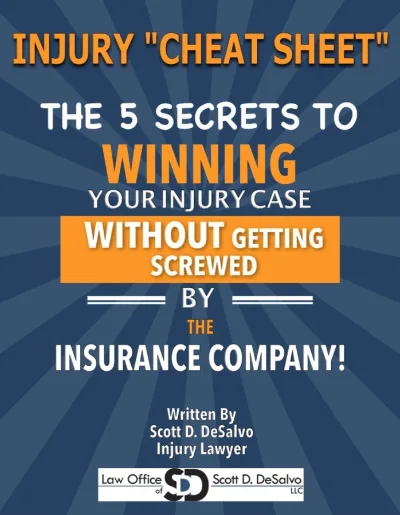
I help a lot of injured people, especially people who get hurt at work. And when you get hurt at work it's natural to wonder how long you'll have to wait for your workers comp settlement.
In this article I'm going to talk to you about how long you will probably have to wait before your workers comp case will settle.
The very simple answer.
Two things to think about:
First, If your case is "disputed", it slows things down because they do not want to pay ANYTHING. They want to fight the case. They think there is a reason why they will win if it goes to trial before the Workers Comp Judge (Arbitrator).
Second, different law offices handle injury cases at a different rate of speed.
In most law offices it's likely that you may have to wait two years or more for your workers comp settlement to happen. That's because injury law offices must handle multiple cases in order to stay in business. Since injury lawyers only get paid when they win, lawyers have to handle multiple cases for cash flow reasons. So they are handling lots of cases so your might go on the 'back burner' is the office isn't modern and efficient.
In my office, we are highly efficient. In most workers comp cases, the case is settled within a year or so. That's not a promise.
Some cases take much longer and it depends on several factors. I want to discuss these factors with you below.

If an injured employee tests positive for alcohol, marijuana, or other drugs in a postaccident drug test, this is almost a guarantee that the workers comp insurance company will fight workers comp settlements.
Usually, in workers comp cases, if you can prove that you were hurt in the course and scope of doing your job, benefits, in theory, are automatic. But insurance companies always look for reasons to deny or delay payment
I've handled lots of cases where a positive drug test or alcohol test after an accident or injury at work gives the insurance company exactly the excuse they need to fight your case.
EXAMPLE:
For example in one case, I had a worker who was carrying boxes downstairs. He tripped and fell with the boxes and hurt his back and twisted his knee.
After the fall, the company sent him for a drug test. The drug test came back negative for alcohol but positive for cocaine.
Then, the insurance company did not want to pay benefits under workers comp because they argued that the injured worker was "high" at the time that the accident happened.
In that case, we were able to successfully find a doctor as a witness. He said that the drug test did not necessarily mean that the injured worker was under the influence of any drugs or alcohol at the time he fell, and we were able to win the case for the injured worker and get him a workers comp settlement.
But it did slow the case down.
“Bad Behavior” or Non-Work Related
If you get hurt at work but you are not doing work activities, this gives the insurance company a defense to your claim or at least the potential defense. Or maybe we should just call it an excuse not to pay.
EXAMPLE:
For example I represented a client who was a delivery driver. He went on his lunch. He drove the company truck to his girlfriend's house and on his way to his girlfriend's house he got into a crash.
Normally something like this would involve a car crash case and a workers comp case. But because he was driving during his lunch hour and not accomplishing a business purpose but instead was going to visit his girlfriend, the insurance company had a strong defense.
We were still able to settle the case for a little bit of money but it definitely slowed down his workers comp settlement.


One of the most common things that slows down workers compensation cases from settling quickly is if the patient or the injured worker is seriously hurt. If somebody is seriously hurt and is still getting medical care and is still improving, it would be a big mistake for us to settle the case.
Once we settle a workers compensation case, we usually can't go back and ask for more money. So we have to be very certain that we understand the full extent of the injury, the necessary medical care, whether you will be able to go back to work doing the same job, and what your permanent problems are.
The lump sum of money and injured worker gets in settlement if they get hurt on the job is called "PPD". This stands for Permanent Partial Disability. It is basically a lump sum of money you get at the end of the case for any permanent problems you have as a result of the work-related injury.
It shouldn't be hard for you to see that settling your case and getting you a certain amount for PPD is a bad idea because maybe you have much more serious and permanent injuries than we know. We have to make sure that we get you as will well as you can get. In other words you have to heal as much as we can heal you or we need a note from the doctor saying you will never get better.
It is wise to do this before accepting a workers comp settlement because the bigger and more permanent injury, the more case the money is worth. And I would never want to short settle a case for somebody who got hurt at work.
It is common for me to talk to at least a few people your will try to handle their workers comp case themselves. The company and insurance company seem like they are cooperating so they figure "why hire a lawyer"?
But here's what I see time and time again: the injured person cooperates but at the end of the case, once they are painted into a corner, the insurance company gets tough.
Maybe they send them to work full duty before they are really ready to go. Maybe they cut off their medical care when they still need it. Maybe they stop paying them while they're off work.
Getting a lawyer involved early in your case will make sure that you don't get maneuvered into a situation where you have no ability to fight back in the case. A good lawyer knows how to position your case from the very beginning to make it as strong as possible so none of this workers comp insurance shenanigans goes on in your case and you get all the benefits you deserve.
Another thing that happens is the company tries to never pay any PPD to an unrepresented person. In other words, they pay the doctor bills, they pay the bills for they pay you while you're off work. But after you have reached MMI (Maximum Medical Improvement), they never offer you or talk to you about a lump sum payment at the end of the case.
We know why they do this. It saves them a lot of money in workers comp settlements. But you are entitled to it, but only if you know how to fight for it and how to file a workers comp claim.
Once the three year deadline on a workers comp case passes and nothing has been filed at the Worker's Compensation commission, you can never ask them for that PPD lump sum money afterwards.
That's why having a lawyer involved is a good idea. One of the main things lawyers do is protect the deadlines for injured people.
Navigating a workers' compensation case can be complex, and delays can be frustrating. Whether your case is straightforward or involves disputes, having an experienced workers comp lawyer on your side ensures you get the benefits and settlement you’re entitled to.
At the Law Office of Scott D. DeSalvo, we also handle personal injury claims, car accidents, slip and fall cases, medical malpractice, and nursing home abuse claims. No matter your situation, we fight to get you the compensation you deserve.
If you have questions or need legal guidance, don’t wait contact us today for a free consultation. Let us help you take the next steps with confidence!
Would you like to know more about how long does workers comp case take? Click here!
If you or a loved one is dealing with a situation like this, give us a call any time, day or night. We are here to help. 312-500-4500


Scott DeSalvo founded DeSalvo Law to help injured people throughout Chicago and surrounding suburbs. Licensed to practice law in Illinois since 1998, IARDC #6244452, Scott has represented over 3,000 clients in personal injury, workers compensation, and accident cases.
No Fee Unless You Win | Free Consultation | 24/7 Availability Call or Text: (312) 500-4500
>>Read More
Main Office:
1000 Jorie Blvd Ste 204
Oak Brook, IL 60523
New Cases: 312-500-4500
Office: 312-895-0545
Fax: 866-629-1817
service@desalvolaw.com
Chicago and Other Suburban Offices
By Appointment Only